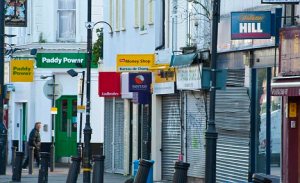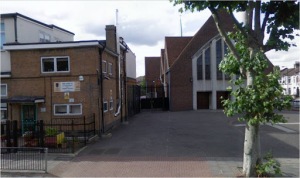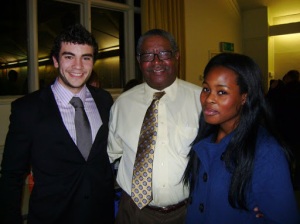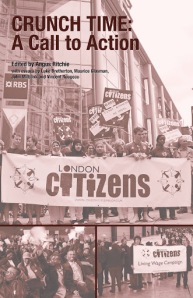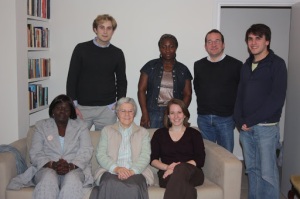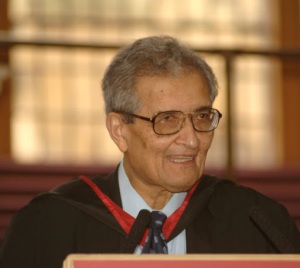Bishop Doug Miles, from koinonia Baptist Church in Baltimore, is a leading figure in community organising in the US. Last week, he preached the 2010 Jellicoe Sermon in Magdalen College Chapel:
As I prepare to preach this sermon, I am requesting those present who are 35 and older to help me preach. If you are in agreement with what I say, give affirmation by a nod of the head, the wink of an eye or by letting a smile play across your lips.
M. Craig Barnes, in his marvellous book ‘When God Interrupts’, makes the assertion that “God must save most of us from ‘the life of our dreams’”. That most of us do not end life, nor find ourselves at this junction of life doing what we thought as teenagers or even young adults doing what we had wished for or expected doing, most of us are not married to the heartthrob of our teen years. Many of us are not doing professionally what was our original life’s quest. Many of us are not living where we thought we would reside or are not travelling roads we thought we would travel.
Thanks be to God that in His omniscience, He has delivered us from the life of our dreams. Why does he do this? I venture to say that He does so for one of at least three reasons.
1. The life of our dreams may not have been what was best for us.
2. It may not be what God wants for us.
3. It may have ended in our destruction rather than our usefulness for the kingdom.
This was true of a shepherd boy king named David in his humanity; and probably true for Jesus in his ever dawning sense of his divinity.
David, the youngest of Jesse’s sons, in the culture from which he comes, could not have dared dream that his life would carry him down the road its does nor to the dizzying heights he attains. In Jewish culture of that day the youngest son was last in line for inheritance, last in line for the patriarchal blessing last in line to secure a wife, last in line to leave the father’s house. Last, last, last. It did not matter how gifted he was, nor what spirit of ambition drove him or how willing he was to work – his destiny was to be last.
Yet David probably never dreamed of becoming a great psalmist and blessing family, friends and the kingdom with the gifts so richly bestowed upon him. Hear him:
“In your strength the king rejoices, O Lord
And in your help how greatly he exults.”
“The earth is the Lord’s and all that is in it,
The world, and those who live in it.”
“The Lord is my shepherd, I shall not want.
He makes me lie down in green pastures.”
“The Lord is my light and salvation: whom shall I fear?”
A blessed musician with ability that far exceeded the ordinary, David probably dreamed of dazzling the ladies with the playing of the lute or mesmerizing a generation with the melodies produced at his hand.
He never imagined he would be King of all Israel and called a “Man after God’s own heart”.
And most assuredly our Lord – Jesus – made a similar journey to his place between two thieves on a cross on a hill called Calvary. In his humanity as a child, he could not have possibly the winding road of his life nor that one day, centuries later we today would be gathered in this place dedicated to His glory as we worship Him as “King of kings and Lord of lords”.
He had such an impossible beginning that we have glossed over with tradition and the hindsight of adulation. A bastard child of what seemed an illicit relationship between a young woman engaged to a man probably four times her age who on the eve of her marriage turns up pregnant by an unknown father.
Tradition said and literally required that she at worst be stoned to death for her seemingly shameful dalliance and at best be returned in shame to the house of her father as damaged goods.
So as a child – a middle child of a stepfather with sons and daughters both older and younger than Jesus, and Jesus as Mary’s eldest child who bore the chief responsibility for her welfare in old age – his horizons were severely limited by life’s circumstances.
Yet he probably dreamed of becoming a master carpenter in the king’s service who one day would be called upon to design and build the framework for some magnificent structure in Jerusalem – a structure that would dazzle men and be blessed by God. And as in the case of David, he too had to be rescued from the life of his dreams.
There are some seated here today who will be delivered from the life of your dreams and thanks be to God for that deliverance.
So how do we get from the life of our own dreams to a life that counts beyond itself? Allow me to suggest three quick points and I will be done.
I.
To claim a life that counts beyond self one has to come to a day of decision for God.
Our faith is not a faith of osmosis whereby we can acquire a relationship with God simply by being around people who have such a relationship. Religious faith is like a tooth brush – each person should have his or her own and use it regularly. And life will lead you in some directions that will cause you to choose for or against God, especially if you seek to be open to His revelations.
David found this to be true early in life. As he kept his father’s sheep there was a time when a bear came to destroy the flock and he slew the bear with sling shot in hand. On another occasion a lion attempted to harm the flock and once again sling shot in hand he killed the lion. What some would have pointed to as either luck in human skill David saw as divine intervention for His sake.
The Bible informs us that age 12, Jesus is found by a frantic Mary searching for what she believed to be her lost son, finds him in the Temple in Jerusalem, and when chastised Jesus responded, “Did you not know I must be about my father’s business?”
We do not know what revelation led to that declaration but we do know that 18 years later he sits in a synagogue in Nazareth, quotes from the prophet Isaiah, and claims a place in the prophetic tradition of Israel: “The Spirit of the Lord is upon me…”
If you want a life that counts beyond self – in the days of your youth choose for God.
II.
To live a life that counts beyond self requires a willingness to take risks, we are challenged to dare to be different – to march to the beat of a distant drummer.
One day David took provisions to his older brothers who were engaged in battle against the Philistines – as he approached the battlefield he found a giant named Goliath daring the children of Israel to send down to the valley a man that would dare to stand up to him. David saw “teachers, scholars, pastors and preachers, captains and generals” on the mountain side afraid to go down to the valley. And this shepherd boy, this slight lad of shepherd status dared in the name of God to go forth and sly the giant.
Our Saviour, Jesus Christ, one day walked away from his carpentry shop, walked away from family and risked scorn, ridicule and pity because of what he believed to be God the Father’s claim in his life.
What are you willing to risk to be on the right side of justice, to be on the side of that arc of the universe that bends towards justice?
Are you willing to do as Jesus did and exchange the truth the moment for the fact of the matter?
The truth of the moment – Jesus gives up carpentry
The fact of the matter – He claims the Sonship of God
The truth of the moment – the lure of the prosperity of the healer
The fact of the matter – true treasures are found in heaven
The truth of the moment – the ridicule of men
The fact of the matter – The affirmation of the father: “This is my Beloved Son in whom I am well pleased.”
What are you willing to risk to claim a life beyond self?
III.
To claim a life beyond self requires a willingness to be available to God.
In all his shenanigans and moral mess David always made himself available to God when god wanted to use him.
Jesus in the Garden of Gethsemane made the conscious choice to make Himself available for a divine appointment on Cavalry.
God does not call us to be the best at anything – though some of you are and will be.
He does not challenge use to be the brightest – though some of you are.
He calls us to show up, available and willing to be used.
He calls up to show up, as Noah did to build the Ark.
To show up as Joseph did to save his family from famine.
Show up as Moses did to go back to Egypt to tell Pharaoh to let God’s people go.
Show up as Joshua did to fight the Battle of Jericho.
Show up as Daniel did to meet and slay a giant named Goliath
Show up as Nehemiah did to rebuild the walls of Jerusalem.
Show up as Esther did proclaiming, “If I perish, I perish. I am gone to see the king.”
Show up as Jesus did for a date on Calvary.
And if we show up, God will show off in and through our lives.
Are you willing to live a life that counts beyond self?
 Sarah Hutt, who is leading our work on housing, blogs on the astonishing reality of the incarnation – a God who is homeless…
Sarah Hutt, who is leading our work on housing, blogs on the astonishing reality of the incarnation – a God who is homeless…

